Eric Harris allegedly shot Columbine victim Rachel Scott because she said yes when he asked her if she believed in God — but the evidence doesn't support this claim.
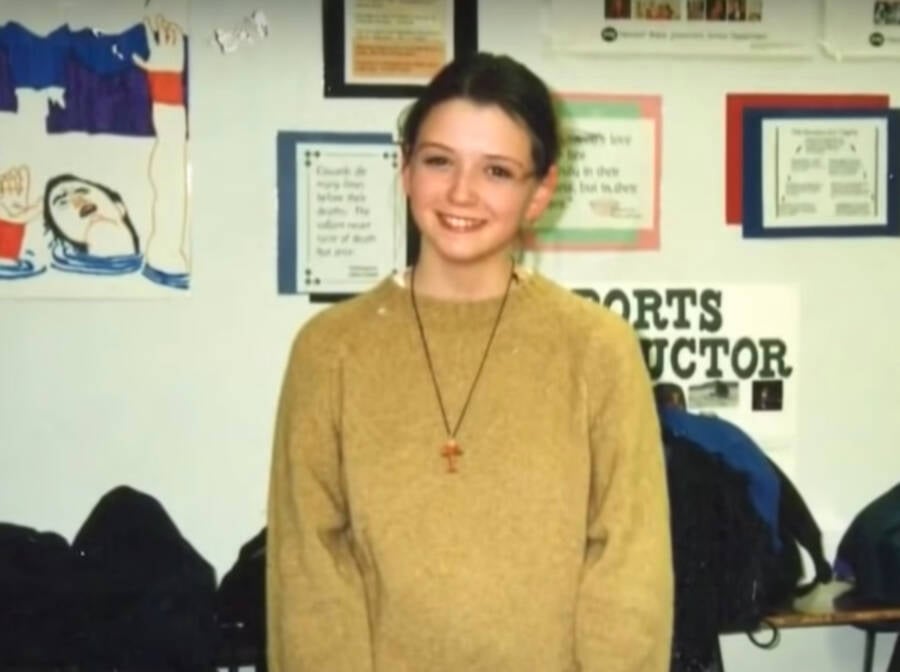
NewsChannel 5/YouTubeWhile Rachel Scott was eating lunch on the lawn of Columbine High School on April 20, 1999, Eric Harris shot her dead — making her the first victim of the Littleton massacre.
Rachel Scott had big dreams for herself. The enthusiastic 17-year-old from Colorado wanted to become an actress or perhaps a missionary. But her life was tragically cut short when she was killed on April 20, 1999, during the Columbine High School massacre.
Scott was eating lunch with a friend when shooters Eric Harris and Dylan Klebold began their attack. Scott was their first victim, and, before killing her, Harris allegedly asked Scott if she believed in God. Scott, a devout Christian, purportedly said that she did, and he shot her.
By the end of the massacre, Scott and 11 other students as well as one teacher lay dead, along with the two shooters themselves. In the years since the Columbine massacre, Rachel Scott has become something of a Christian martyr because of her steadfast faith.
However, some questions remain about the account later circulated regarding her horrifying final moments. This is the true story of Rachel Scott and her tragic murder at Columbine.
Rachel Scott’s Death During The Columbine High School Massacre
Born on Aug. 5, 1981, Rachel Scott was a devout Christian from an early age. She even thought about becoming a religious missionary after graduating from Columbine High School. Sadly, she never got the chance.
On April 20, 1999, she was having lunch with a friend, Richard Castaldo, outside the entrance of their high school when Eric Harris and Dylan Klebold began their attack.
The two shooters had intended on killing as many of their peers and classmates as possible in an attempt to beat Oklahoma City bomber Timothy McVeigh’s kill count. They were forced to resort to their arsenal of firearms when the two main propane bombs they’d made failed to detonate.
They charged the school’s entrance, where Castaldo recalled that Harris and Klebold started yelling at Rachel Scott.
“They were yelling at her about God and do you believe in God,” he said. “That was literally the last minute of her life.” The Harris shot her dead.
Castaldo also claimed that he, too, was asked whether or not he believed in God and that when he said that he didn’t, that his life was spared.
Meanwhile, Scott’s own brother, Craig, didn’t even realize he’d walked past his sister’s corpse that day as panic, adrenaline, and shock can create an insurmountable deficit in rational thinking and awareness.
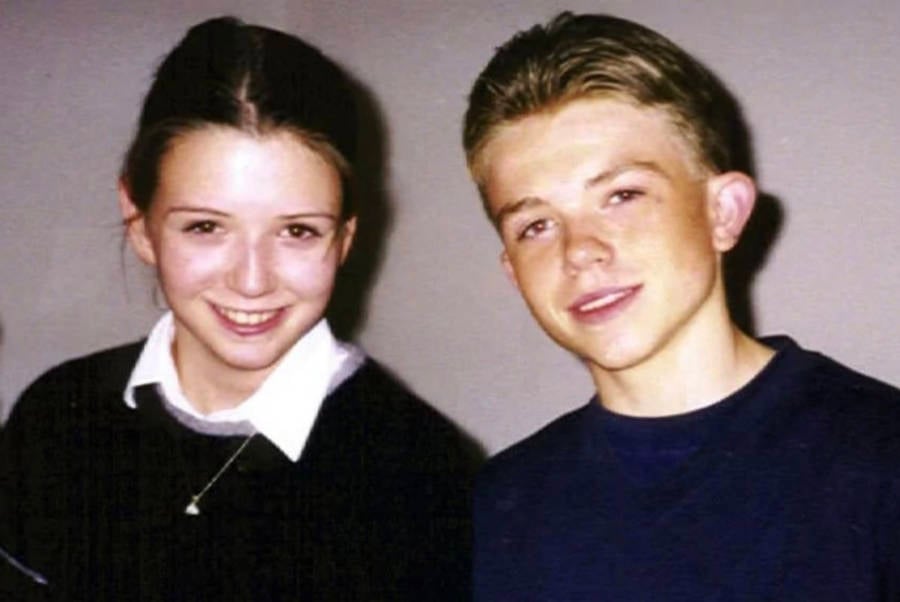
Columbine.WikiaRachel Scott and her brother, Craig.
“I heard the shot that took my sister’s life,” Craig told The Hollywood Reporter. “I thought it was a prank — that some seniors brought fireworks to school. When I escaped the library, I actually ran right past her body and didn’t realize it.”
According to Today, when Craig managed to exit the building and get to a phone, he sensed something terrible had happened to his sister. “I called my mom, and I said, ‘Mom, I’m OK, but I think there’s something wrong with Rachel,'” he said. It took until the following morning for his bad feeling, and her death, to be confirmed.
In the aftermath of the Columbine shooting, stories of Rachel Scott’s death — and her allegiance to her faith — quickly spread.
But is that the full story?
The Supposed Martyrdom Of Rachel Scott
Investigations after the tragic event indeed reported that Eric Harris asked Rachel Scott whether she believed in God before he killed her. In the early days following Columbine, this claim was made in more than one separate instance: fellow victim Cassie Bernall was also thought to have been killed specifically because she was asked the same question about God and answered in the affirmative.
While time eventually revealed that this wasn’t the case for Bernall (but instead, for another victim for whom Bernall had been mistaken), it does seem to have comprised Scott’s last experience alive. Her mother, Beth Nimmo, claimed in interviews that her daughter tried to befriend Dylan Klebold and that he had grown fond of her.
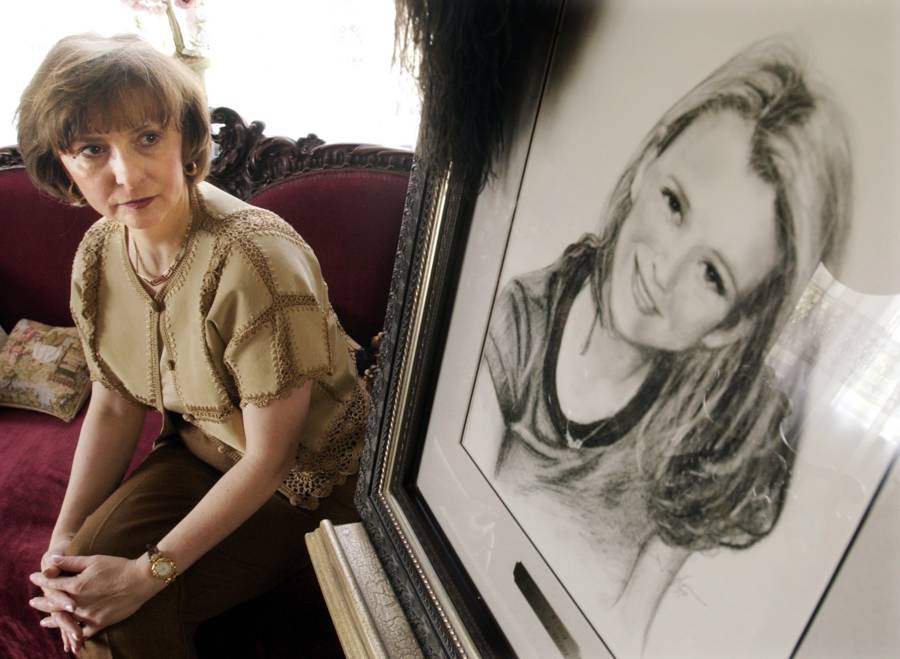
Glenn Asakawa/The Denver Post/Getty ImagesRachel Scott’s mother, Beth Nimmo, looking at a sketched portrait of her daughter on display in her living room, April 30, 2002.
Nimmo also said that during the weeks before the Columbine massacre, both Eric Harris and Dylan Klebold “mocked [Rachel] and made fun of her because of her Christian values. She was on their target list.”
Nimmo additionally published Rachel Scott’s journals after she died in an effort to show the world how strong her daughter’s Christian values were and, presumably, to facilitate mentally processing that her 17-year-old daughter was shot to death. Both parents eventually co-authored Scott’s biography.
“I am not going to apologize for speaking the name of Jesus,” Scott wrote in her journals. “If I have to sacrifice everything… I will.”
Her father, Darrell Scott, promulgated her devout faith in two books of his own — Chain Reaction: A Call to a Compassionate Revolution and 2008’s Rachel Smiles: The Spiritual Legacy of Columbine Martyr Rachel Scott — the latter of which used excerpts from her journals.
In 2016, Scott’s story of facing down her anti-religious killers by being steadfast in her faith even went to the big screen in the film I’m Not Ashamed starred Masey McLain as Scott.
While the film generated decent box-office returns for a Christian film focused on a school shooting, and Scott’s parents did an admirable job of sharing their daughter’s memory through numerous books and interviews, the entire narrative of Rachel Scott’s final moments, sold as a product and perpetuated by the media in all sorts of formats, may have been more of a construct than the actual truth.
The Truth About Rachel Scott Supposedly Being Killed Because Of Her Faith
Later investigations — particularly those included in Dave Cullen’s Columbine — categorically disagreed that the shooters had any religious, ethnic, or gender-based targeting in terms of victims. Cullen described the media’s coverage of Columbine as the beginning of the industry’s desperation for “spectacle murders” — fitting the reportage to previously established mythologies and explanations. This is how tall tales of martyrdom in the face of tragedy occur.
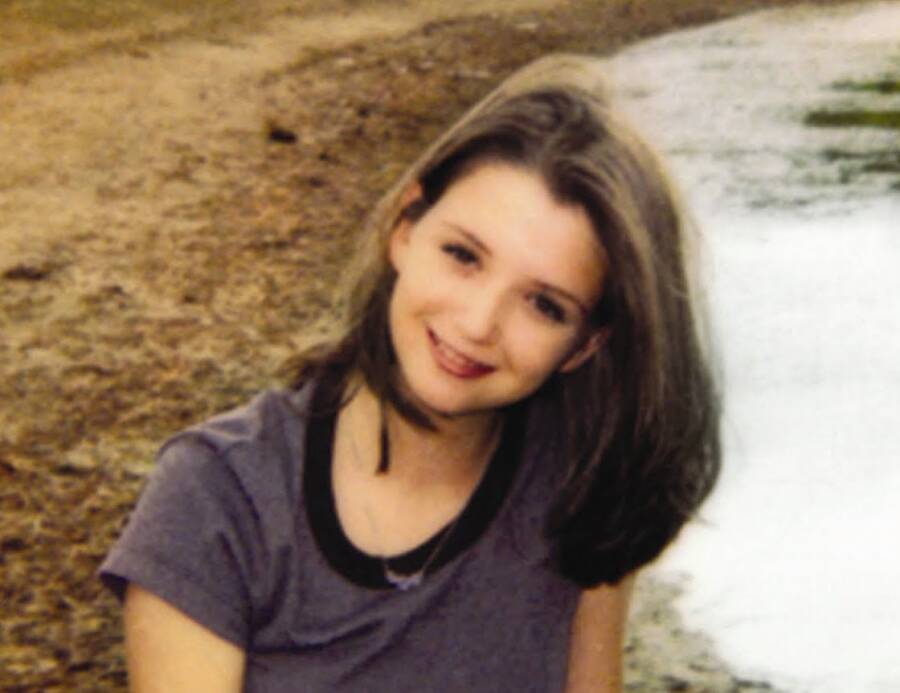
Wikimedia CommonsAfter 17-year-old Rachel Scott was killed at Columbine in April 1999, Christian groups spread exaggerated stories that she was killed because of her faith.
The Guardian‘s Jordan Hoffman similarly argued that turning Rachel Scott’s death into a story about martyrdom was simply “exploiting this young woman’s horrible fate to fit a previously constructed phony narrative of oppression.”
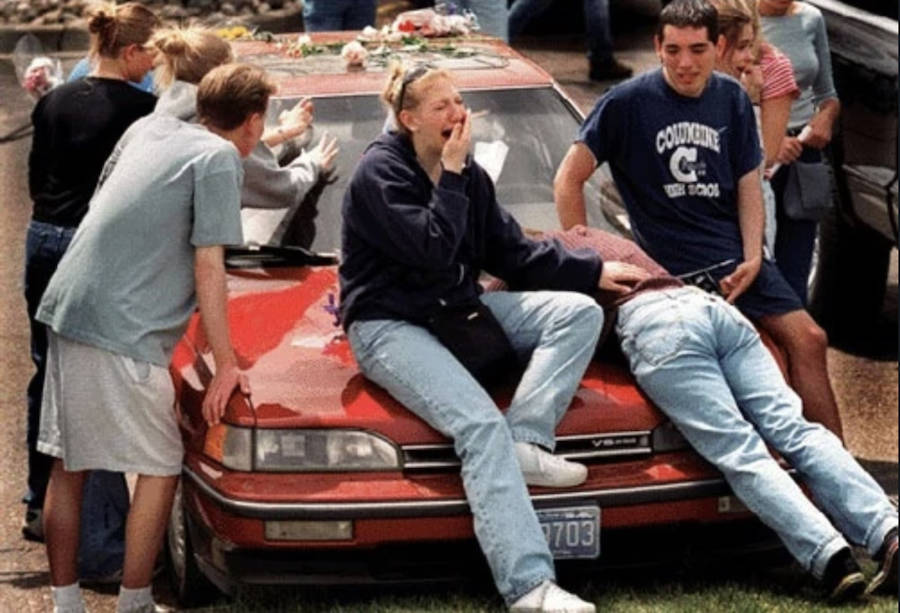
Columbine.WikiaFriends gather around Rachel Scott’s car, placing flowers on it in her memory.
Nonetheless, books, songs, and movies about supposed religious martyrs such as Rachel Scott shaped the narrative. The fervor to become such a symbol quickly permeated a big portion of an entire generation, with Washington Post journalist Hanna Rosin covering this phenomenon as early as October 1999.
She described this teenage obsession with faith-based death as a “kind of teenage hysteria, a Christian-sanctified death wish” directly influenced by the Columbine killings of people like Rachel Scott. “God has laid it on my heart that I’m going to be martyred,” a teenager named Tina Leonard told a Southern Baptist news service, Rosin reported. “When I told one of my friends, he said, ‘That’s awesome. I wish it could happen to me.'”
But while Rachel Scott has inspired many, her memory remains deeply personal to those who knew her.
The Scott Family Finds Faith After Columbine
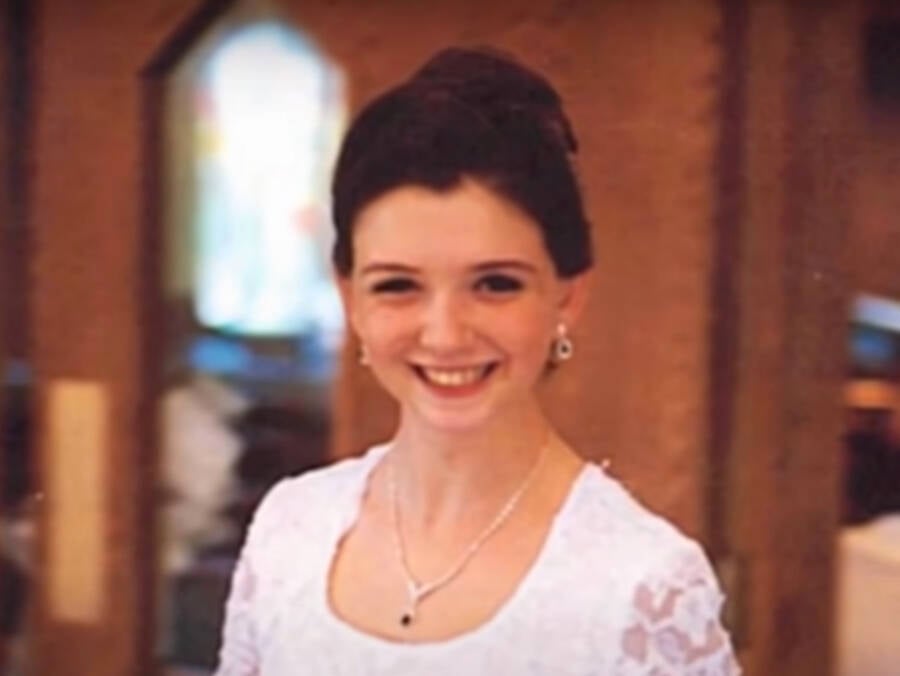
NewsChannel 5/YouTubeColumbine victim Rachel Scott is widely remembered as a martyr by Christian groups, though there’s no evidence that she was killed because of her faith.
“The days right after…you’re in so much shock,” said Craig Scott. “You could ask me a question, and I could just sit there, looking at you, because I’m not even there.”
Rachel Scott’s parents would soon pick up the proverbial baton of religious faith left behind when she died — but her brother initially seemed preoccupied with visions of justice and retribution in order to mentally process his sister’s passing.
“I used to fantasize what it would be like to get revenge soon the shooters,” he said. “If I had just five minutes alone, what I’d do to them. And it started to eat me up.”
The first time Craig spoke about his sister’s death was in an interview with Katie Couric. He’d soon find himself talking to countless people about his sister, the trauma, and that it can be overcome. “I had no idea that would be something I would be doing a hundred, a thousand more times over the next 20 years.”
Craig and his mother have toured schools across the country in an effort to spread Scott’s story, that she died in cold blood and likely because of her faith. This has garnered the family a fair amount of flack from internet users who theorized this crusade was entirely motivated by profit.
“We’ve stopped a dozen school shootings and 500 kids said we helped prevent their suicides,” said Craig Scott. “Money has never been our motivation. It’s a mission. I have friends from Columbine who ask, ‘How can you still talk about this?’ If they go on one trip with me, they’d understand.”
Rachel’s Challenge And The Continued Legacy Of Rachel Scott’s Tragic Death
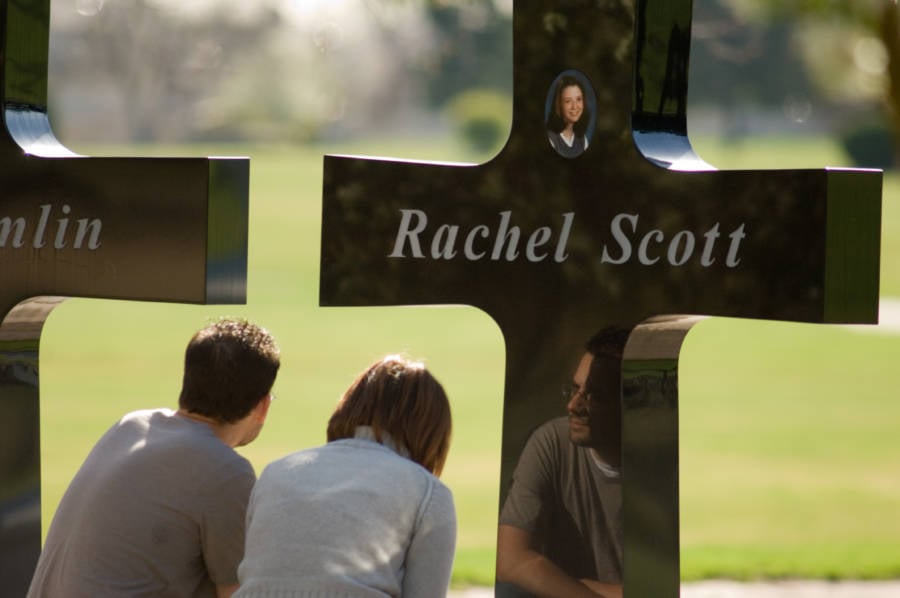
Kevin Moloney/Getty ImagesRoger Kovacs and his wife Lesli in front of Rachel Scott’s memorial. Chapel Hill Memorial Gardens, Littleton, Colorado, April 20, 2007.
When the Scott family began wading through their daughter’s personal items following her death, they found an essay she wrote about her ethics — how compassion, optimism, and empathy were the main traits she’d tried to nurture in herself, and spread to others.
“She was talking about…things like not judging or labeling other people, looking for the good in others and being a leader, showing mercy and forgiveness,” said Scott, adding that his sister concluded the paper with the following:
“I have this theory that if one person will go out of their way to show compassion, it will start a chain reaction of the same.”
The Scott family’s Rachel’s Challenge nonprofit has spread this ideology to more than 25 million people to date. It gave them purpose, after a confounding loss that had no identifiable reason or cause. It provided the family with their own version of faith — that if Rachel Scott’s vision is shared, her death wasn’t entirely in vain.
“I think she would be proud of my family,” Scott said. “I hope to see her one day again…If she were somehow aware of what has happened with her story and her legacy, and to say, ‘Nice job, little bro,’ that would be pretty cool.”
After learning about Rachel Scott and her role in the Columbine High School massacre, read about the Trench Coat Mafia and other myths associated with Columbine. Then, read about Brenda Ann Spencer, the woman who shot up a school because she didn’t like Mondays.





